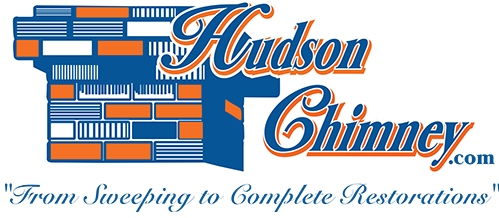by Mark Hudson | Mar 27, 2015 | Chimney Water Damage
If your home has a masonry fireplace, you might know that the Chimney Institute of America (CSIA) has named water as the biggest enemy of your chimney. Water penetration of your chimney is the biggest cause of expensive and extensive damage to the interior and the exterior of your home. Keeping water out of your chimney is the essential key to prevent the deterioration of the entire structure. At Hudson Chimney, our CSIA-certified technicians are well aware of the damage water can do to a masonry chimney, and we can find the leak, repair the damage, and then prevent further water penetration of your chimney. Often asked by our customers how water can be such a big problem, we would like to share three ways water leaks can do lots of damage to a masonry chimney.
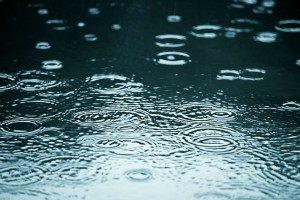
1. Water leaks can cause brick and mortar spalling, which can lead to structural damage.
The exterior bricks and mortar of your chimney suffer a great deal of water exposure, and this water will penetrate into the materials, which causes them to erode. When this trapped water freezes inside your bricks and mortar, the breaking apart, cracking, and loss of masonry materials occurs when the temperatures rise and the water thaws. The expansion of the thawed water can be too much for bricks to endure, which is why they become loose and/or break off of your chimney. This phenomenon is known as spalling, and unrepaired spalling can lead to possible severe structural damage of your chimney. Additionally, water will continue to invade your chimney through the holes provided by the spalled bricks and mortar. If you ever notice loose bricks or mortar on the exterior of your chimney, contact Hudson Chimney for a chimney inspection. We will repair the damage and waterproof your chimney to prevent spalling from occurring again.
2. Water leaks can cause cracks and other deteriorations to your chimney flue liner, which can lead to carbon monoxide poisoning.
Water penetration not only affects the bricks and mortar of your chimney, but it causes damage to your interior flue liner as well. If you have a clay chimney liner, cracks will form due to water leaks, and if you have a metal chimney liner, rusting will occur from water exposure. Both of these problems can cause your liner to break apart and crack. A cracked liner can be a health hazard since your chimney liner serves to protect you and your family from the by-products of combustion, like toxic smoke and carbon monoxide, from entering your home. At Hudson Chimney, we can repair and restore clay chimney liners with HeatShield, and we can replace damaged liners with a durable stainless steel.
3. Water leaks can cause interior damage to your home, including stained walls and ceilings and mold growth.
Not only does water penetration of a masonry chimney cause many issues to the chimney itself, but a leaky chimney can also stain the ceilings and walls of the room where your fireplace is located. If you find water leak stains in your fireplace room, you should also consider the possibility of mold growth in the ceilings, walls, fireplace, and chimney. Contact Hudson Chimney as soon as possible if you ever see this sort of water penetration damage.
If you have more questions on what types of damage water penetration can do to a masonry chimney, contact Hudson Chimney today. We are happy to help you repair and prevent this kind of damage to your fireplace and chimney.
by Mark Hudson | Feb 26, 2015 | Top Sealing Damper
According to the Chimney Safety Institute of America (CSIA), a damper is an important component of every chimney. Essential for an energy-efficient home, the damper keeps the heat in and the cold air out of your house, which saves you money on heating bills. Your damper is also used to control the flow of smoke, gases, and the other byproducts of combustion up the chimney to exit your home. Available in two different types, you can choose between the throat damper and the top-sealing damper. Also known as the traditional fireplace damper, a throat damper is installed right above the firebox and is found in many old masonry chimneys. However, this type of damper has many flaws and issues. At Hudson Chimney, we strongly recommend the top-sealing damper over the throat damper. We would like to tell you more about the benefits of these dampers.
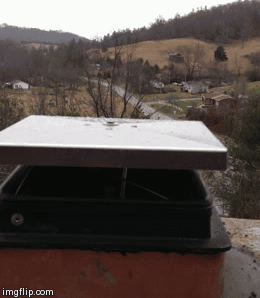
This clip is courtesy of Richie Baxley at Environmental Chimney Service in Asheville NC.
A top-sealing damper serves two functions, allowing you to “kill two birds with one stone.”
One of the main benefits of a top-sealing damper is that it also serves as a chimney cap when the damper is closed, and, to be honest, this type of damper actually gives you better protection than an ordinary chimney cap. Equipped with a silicone rubber gasket that seals in heat and air conditioning as a damper, a top-sealing damper also gives you an air-tight seal to keep out water, debris, birds, squirrels, and raccoons — just as a chimney cap would. When our customers need a new chimney cap, Hudson Chimney will recommend that they install a top-sealing damper instead of a chimney cap. Some models of top-sealing dampers come with caps, so even when the damper is open, your chimney is still protected from debris and animals.
A top-sealing damper will save you both energy and money.
Throat dampers just do not completely seal as well as top-sealing dampers. You will not have to worry about cold air, ice, and snow entering your flue to create a cold core in your chimney. A cold core tries to cool your home at the same time that your heating system is trying to warm it up, which wastes both fuel and money. As a top-sealing damper sits atop your chimney, cold air never even has a chance to get anywhere inside because your entire flue is sealed air-tight with the silicone rubber gasket. Believe us when we say you will save money on both cooling and heating bills when you install a top-sealing damper.
A top-sealing damper is easy to operate.
With some throat dampers, you must practically stick your head up the fireplace to open and close them. When you have a top-sealing damper, opening and closing the damper is simple. A stainless steel cable from the damper drops down the chimney and connects to an easily-accessible handle which is mounted inside the firebox. Different models will have different opening and closing methods, but Hudson Chimney guarantees you will find all easy to use.
Want to know more about the benefits of top-sealing dampers? Contact Hudson Chimney to find out even more advantages to this type of damper.
by Mark Hudson | Feb 6, 2015 | Chimney Service
Believe it or not, spring is on its way, and fireplace season will be slowing down. To be sure your chimney is safe after a long and cold winter, scheduling your annual chimney sweeping and inspection now is essential, especially if your chimney is in need of important repairs. At Hudson Chimney, one of our busiest times of the year is the spring, and if you procrastinate for too long, you may have to wait for several weeks before you can arrange an appointment for our certified technicians to visit your home to clean, examine, and repair your chimney. According to fire safety organizations such as the National Fire Prevention Association (NFPA), it is recommended you schedule a chimney sweeping and inspection once every year. We would like to share with you the important chimney maintenance steps our chimney technicians will take to find essential repairs needed to make your fireplace and chimney system safe.
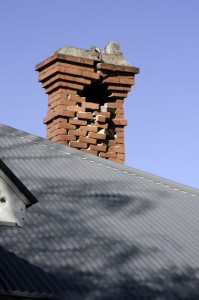
CHIMNEY SWEEPING
When the Chimney Safety Institute of America (CSIA)-certified sweeps at Hudson Chimney clean your chimney after winter, our main concern is removing all of the creosote deposits that have accumulated on the walls of your chimney. Forming naturally as the by-products of combustion (smoke, gases, tar fog, vapors, etc) exit the cooler walls of your upper chimney, creosote is the highly combustible result of the condensation that occurs. Creosote can be either black or brown, and its appearance can vary. Whether it is sticky and gummy, crispy and brittle, or shiny and hard, creosote, especially in large amounts, is extremely flammable, which makes it the cause of a majority of chimney fires. Getting rid of these creosote buildups after winter’s heavy fireplace usage is essential to the safety of your chimney.
CHIMNEY INSPECTING
Hudson Chimney takes pride in performing detailed post-winter chimney inspections because we want to find any damage that needs repairing to ensure the safety of your fireplace and chimney. Of course, we seriously examine every part of your chimney; however, there are specific repairs we are looking for, including the following:
damaged or deteriorated masonry — Loose bricks and chipped mortar on the exterior of your chimney are sure signs of water penetration damage, and this alerts us to the possibility of water leaking inside your chimney that creates even more damage to its interior. If this masonry damage goes unrepaired, you will end up with costly repair work, including a possible rebuild of your entire chimney.
cracks in the chimney cap — Your chimney cap serves as protection from both water and animal intrusions of your chimney. A deteriorated chimney cap serves no help at all to your chimney. We can repair cracks and other damage to chimney caps as well as install new caps if the existing caps are beyond repairing.
cracks and holes in the chimney flue liner — Water leaks can cause serious damage to the liner of your chimney that can endanger your family’s health. A deteriorating flue liner allows toxic gases like carbon monoxide to leak into your home. Repairing or replacing a damaged chimney flue liner will keep those gases exiting out of your chimney instead of infiltrating the interior air of your home.
Save yourself the hassle of waiting for weeks to maintain your chimney after winter by contacting Hudson Chimney now. We are happy to schedule an appointment for your annual sweeping and inspection as well as perform all necessary repairs.
by Mark Hudson | Sep 15, 2014 | chimney maintenance
Chimney service companies tend to get busy as the fall and winter approach. If you live in the Middleburg, Florida area you may think that booking an appointment to have your chimney swept and inspected is something that can wait. After all, you live in the sunshine state, right? But you would be wrong. The Chimney Safety Institute of America recommends that chimneys be swept by a professional on an annual basis. No matter where you live, the fall and winter are when chimney service companies get booked up. If you want to use your chimney safely and efficiently this winter, you will want to have the professionals at Hudson Chimney clean and inspect it.
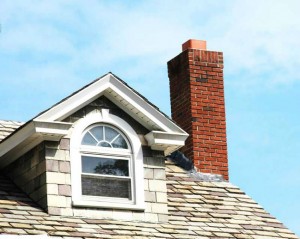
Having your chimney cleaned and inspected can help it to run more efficiently, save you money, and keep your home warmer. Most importantly, however, having your chimney cleaned is important to keeping your home safe from house and chimney fires, carbon monoxide poisoning, and other hazards presented by owning a chimney.
The professionals at Hudson Chimney will work to remove creosote from your chimney. Creosote is an extremely flammable substance that forms when hot gasses and smoke cool in your chimney. Not only can creosote cause fires, but it blocks toxic gasses and smoke from leaving your chimney. When creosote is allowed to accumulate, not only does your risk of fire and dangerous fumes increase, but creosote will build into a caked on substance called glazed creosote, which can only be removed by a professional with strong chemicals. Having your chimney cleaned and inspected annually can help prevent glazed creosote from forming.
The experts at Hudson Chimney will also inspect your chimney for water damage which can cost you a lot of money (and even destroy your chimney) if not properly attended to. They will inspect your chimney for the various causes of water leaks and recommend any repairs that need to be made. You can then set up an appointment with Hudson Chimney to install a chimney cover, have a water repellent applied, or anything else that needs to be done to provide you with a leak-free chimney!
Your chimney will also be inspected to make sure that the appliance was properly installed and that your chimney and appliance are compatible. A flue that is too small for the appliance will not allow for proper ventilation, causing hazardous fumes to enter your home. A flue that is too big for the appliance will accumulate creosote quickly. The technicians at Hudson Chimney will also check to make sure that there are no blockages in your chimney that could cause improper ventilation. Having a chimney cap or damper installed will help to prevent animals and debris from entering the chimney.
So if you have not scheduled your chimney service appointment for this year, call Hudson Chimney as soon as possible to book your appointment before the busy season starts!
